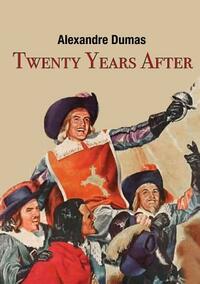Take a photo of a barcode or cover
This book begins the old men part of The Three Musketeers series which is the best part as the writing and characters become more mature.
The majority of the Dartagnan romances take place while the main characters are 40+ so this book establishes much that continues into the next novels. In this book the reader is reintroduced to each of the four characters as Dartagnan tries to get the old friends back together. Aramis is a great ladies man full of political schemes, Porthos is a gargantuan blockhead but is utterly devoted to his friends, Athos is the most honorable and honest man alive, and Dartagnan is still ambitious, intelligent, cunning, and with a wrist of iron.
I don’t want to spoil anything but the heroes work separately for much of the novel but when the four characters begin working together it is excellent. Where The Three Musketeers was the story of Dartagnan with his 3 friends as side characters, this book is more of an ensemble cast with each of the 4 having moments in the spotlight, specifically Athos has some great moments and development.
For history fans this book covers the revolts known as the Fronde. I had never heard of it so it was a joy to learn a little about the Fronde and Cardinal Mazarin. Also, there is some British history mixed in.
The only issue I have with this book is that it’s ending isn’t as good as the endings of the other Dartagnan books. Other than that this book is a great adventure classic. If you’ve read The Three Musketeers you owe it to yourself to read it. While it is primarily an adventure novel there are some interesting themes such as fatherhood, taking responsibility for previous errors, and, of course, loyalty to friends. If you’ve already read this book go read vicomte de Bragelonne immediately. If you haven’t read The Three Musketeers go ahead and read this one, you might be a little lost but you’ll enjoy this tale of intrigue, exploits, and excitement regardless.
The majority of the Dartagnan romances take place while the main characters are 40+ so this book establishes much that continues into the next novels. In this book the reader is reintroduced to each of the four characters as Dartagnan tries to get the old friends back together. Aramis is a great ladies man full of political schemes, Porthos is a gargantuan blockhead but is utterly devoted to his friends, Athos is the most honorable and honest man alive, and Dartagnan is still ambitious, intelligent, cunning, and with a wrist of iron.
I don’t want to spoil anything but the heroes work separately for much of the novel but when the four characters begin working together it is excellent. Where The Three Musketeers was the story of Dartagnan with his 3 friends as side characters, this book is more of an ensemble cast with each of the 4 having moments in the spotlight, specifically Athos has some great moments and development.
For history fans this book covers the revolts known as the Fronde. I had never heard of it so it was a joy to learn a little about the Fronde and Cardinal Mazarin. Also, there is some British history mixed in.
The only issue I have with this book is that it’s ending isn’t as good as the endings of the other Dartagnan books. Other than that this book is a great adventure classic. If you’ve read The Three Musketeers you owe it to yourself to read it. While it is primarily an adventure novel there are some interesting themes such as fatherhood, taking responsibility for previous errors, and, of course, loyalty to friends. If you’ve already read this book go read vicomte de Bragelonne immediately. If you haven’t read The Three Musketeers go ahead and read this one, you might be a little lost but you’ll enjoy this tale of intrigue, exploits, and excitement regardless.
adventurous
emotional
inspiring
medium-paced
Plot or Character Driven:
A mix
Strong character development:
Yes
Loveable characters:
Yes
Diverse cast of characters:
No
Flaws of characters a main focus:
No
The least of the D’artagnan romances, though it does pick up when the musketeers arrive in England.
adventurous
emotional
funny
tense
fast-paced
Plot or Character Driven:
Plot
Loveable characters:
Complicated
Diverse cast of characters:
Yes
adventurous
medium-paced
Plot or Character Driven:
Plot
Strong character development:
No
Loveable characters:
Yes
Diverse cast of characters:
No
Flaws of characters a main focus:
Complicated
adventurous
fast-paced
Comme son titre l'indique, l'histoire se déroule vingt ans après Les Trois Mousquetaires.
Les intrigues politiques et historiques sont beaucoup plus présentes dans ce roman, mais elles continuent de servir la caractérisation des quatre protagonistes. Ces derniers ont vieillis, et leurs chemins se sont séparés, mais malgré les épreuves du temps, leur amitié est toujours le mortier qui leur permet d'affronter les obstacles les plus difficiles.
Pour remplacer l'incroyable Milady, Dumas invente un nouvel antagoniste qui, animé par le bras de la vengeance, surgit tel un fantôme du passé pour obliger nos héros à faire face aux conséquences des actes de leur jeunesse.
Ce roman est à l'image de nos anciens mousquetaires : plus mûr, plus cynique, mais conservant tout de même cette étincelle de malice qui nous avait charmé.
Les intrigues politiques et historiques sont beaucoup plus présentes dans ce roman, mais elles continuent de servir la caractérisation des quatre protagonistes. Ces derniers ont vieillis, et leurs chemins se sont séparés, mais malgré les épreuves du temps, leur amitié est toujours le mortier qui leur permet d'affronter les obstacles les plus difficiles.
Pour remplacer l'incroyable Milady, Dumas invente un nouvel antagoniste qui, animé par le bras de la vengeance, surgit tel un fantôme du passé pour obliger nos héros à faire face aux conséquences des actes de leur jeunesse.
Ce roman est à l'image de nos anciens mousquetaires : plus mûr, plus cynique, mais conservant tout de même cette étincelle de malice qui nous avait charmé.
"Al diavolo le guerre civili!" esclamò Porthos. "Non si può più contare né sui propri amici né sui propri valletti. Ah, se il povero Mosqueton fosse qui! Quello non mi lascerà mai. "
Questo secondo libro dedicato ai Moschettieri è un libro molto più maturo del primo sotto tutti i punti di vista.
E' più maturo come libro in sé, più unitario e costante, senza le continue smargiassate e i colpi di scena architettati ad arte per far comprare il capitolo successivo.
E' più matura la tematica, dato che dalle scaramuccie tra i Moschettieri e il Cardinale (con i primi sempre comunque abbastanza protetti "dall'alto" e il secondo mai realmente deciso a eliminare questi suoi avversari formidabili), si passa a una situazione politica parecchio diversa. La guerra civile a Parigi, giochi di potere operati tra le alte sfere che decidono schieramenti e vite, amici separati, sospetti, sfiducia. Perché come puoi fidarti di chi ti sta accanto, quando scoppia una guerra civile?
E' più maturo perchè sono più maturi loro, i protagonisti. Sono passati, ovviamente, venti anni.
Venti anni durante i quali per un po' saranno rimasti insieme, così come col Cardinale, ma poi ognuno è finito con l'andare per la sua strada.
Una strada che, mentre ha portato Athos a fare come sacrosanto il nobile in campagna, crescendo un radioso protetto, Porthos ad accumulare terre e castelli, e Aramis a diventare abate per la gioia di Brazin, ha avuto solo delusioni per un D'Artagnan ormai immobilizzato nel ruolo abbastanza umile di luogotenente dei Moschettieri, al servizio come sempre di una Regina irraggiungibile e altera, reggente di un re bambino che si avvicina rapidamente all'età del trono, e manipolata abilmente da un nuovo Cardinale, ben più meschino e gretto dell'illustre predecessore cui chiunque lo paragona.
Mazarino.
Ed è proprio Mazarino il fulcro della guerra civile che scuoterà Parigi.
I realisti con Mazarino, giocoforza, pur nella stranda condizione che quasi tutti i realisti lo disprezzano e lo odiano, a parte la Regina che ne è l'amante; i frondisti contro Mazarino, individuato come causa di tutti i mali della Francia.
E D'Artagnan si ritrova dalla parte del Cardinale per due motivi: il primo è la Regina, cui come sempre è fedele, e il secondo è la promessa di soldi e del titolo di Capitano del corpo dei Moschettieri.
Per ottenere queste cose il buon D'Artagnan cercherà l'aiuto dei vecchi compagni, portando dalla sua Porthos ma scoprendo altresì che Athos e Aramis sono ormai devoti ai loro avversari.
I quattro moschettieri si ritrovano così divisi, col rischio di doversi affrontare, con recriminazioni reciproche da muoversi, col sospetto di tradimenti.
Amici contro amici, padroni contro valletti, mentre la borghesia francese prende consapevolezza della propria forza e la corona trema, così come trema in Inghilterra dove il re è braccato dall'esercito di Cromwell ed entrambi gli schieramenti sperano in un aiuto dalla Francia.
E in tutto questo, un fantasma del passato piomba in mezzo ai quattro minacciandone la sopravivvenza.
Un libro ben scritto, con meno divagazioni, più maturo direi.
Un peccato sia praticamente sconosciuto.
Questo secondo libro dedicato ai Moschettieri è un libro molto più maturo del primo sotto tutti i punti di vista.
E' più maturo come libro in sé, più unitario e costante, senza le continue smargiassate e i colpi di scena architettati ad arte per far comprare il capitolo successivo.
E' più matura la tematica, dato che dalle scaramuccie tra i Moschettieri e il Cardinale (con i primi sempre comunque abbastanza protetti "dall'alto" e il secondo mai realmente deciso a eliminare questi suoi avversari formidabili), si passa a una situazione politica parecchio diversa. La guerra civile a Parigi, giochi di potere operati tra le alte sfere che decidono schieramenti e vite, amici separati, sospetti, sfiducia. Perché come puoi fidarti di chi ti sta accanto, quando scoppia una guerra civile?
E' più maturo perchè sono più maturi loro, i protagonisti. Sono passati, ovviamente, venti anni.
Venti anni durante i quali per un po' saranno rimasti insieme, così come col Cardinale, ma poi ognuno è finito con l'andare per la sua strada.
Una strada che, mentre ha portato Athos a fare come sacrosanto il nobile in campagna, crescendo un radioso protetto, Porthos ad accumulare terre e castelli, e Aramis a diventare abate per la gioia di Brazin, ha avuto solo delusioni per un D'Artagnan ormai immobilizzato nel ruolo abbastanza umile di luogotenente dei Moschettieri, al servizio come sempre di una Regina irraggiungibile e altera, reggente di un re bambino che si avvicina rapidamente all'età del trono, e manipolata abilmente da un nuovo Cardinale, ben più meschino e gretto dell'illustre predecessore cui chiunque lo paragona.
Mazarino.
Ed è proprio Mazarino il fulcro della guerra civile che scuoterà Parigi.
I realisti con Mazarino, giocoforza, pur nella stranda condizione che quasi tutti i realisti lo disprezzano e lo odiano, a parte la Regina che ne è l'amante; i frondisti contro Mazarino, individuato come causa di tutti i mali della Francia.
E D'Artagnan si ritrova dalla parte del Cardinale per due motivi: il primo è la Regina, cui come sempre è fedele, e il secondo è la promessa di soldi e del titolo di Capitano del corpo dei Moschettieri.
Per ottenere queste cose il buon D'Artagnan cercherà l'aiuto dei vecchi compagni, portando dalla sua Porthos ma scoprendo altresì che Athos e Aramis sono ormai devoti ai loro avversari.
I quattro moschettieri si ritrovano così divisi, col rischio di doversi affrontare, con recriminazioni reciproche da muoversi, col sospetto di tradimenti.
Amici contro amici, padroni contro valletti, mentre la borghesia francese prende consapevolezza della propria forza e la corona trema, così come trema in Inghilterra dove il re è braccato dall'esercito di Cromwell ed entrambi gli schieramenti sperano in un aiuto dalla Francia.
E in tutto questo, un fantasma del passato piomba in mezzo ai quattro minacciandone la sopravivvenza.
Un libro ben scritto, con meno divagazioni, più maturo direi.
Un peccato sia praticamente sconosciuto.
adventurous
mysterious
medium-paced
Plot or Character Driven:
Plot
Strong character development:
No
Loveable characters:
Complicated
Diverse cast of characters:
Yes
Flaws of characters a main focus:
No
Another Dumas marathon completed. This is almost as much fun as The Three Musketeers with the returning characters retaining their richness and the new characters adding plenty, chief of whom is Mordaunt, a more than sufficiently evil successor to Milady.
The historical backdrop of a 17th century squabble between the French court and parliament allows for plenty of complications and conspiracies in the plot. I was quite ignorant to most of the history before the book - I wonder whether knowing it in advance would improve or worsen one's enjoyment of the novel?
The historical backdrop of a 17th century squabble between the French court and parliament allows for plenty of complications and conspiracies in the plot. I was quite ignorant to most of the history before the book - I wonder whether knowing it in advance would improve or worsen one's enjoyment of the novel?





